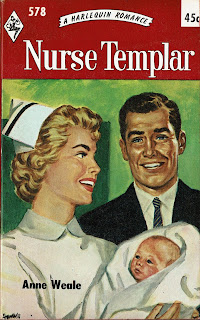Cover illustration by
Jack Harman
The bustling
atmosphere of a brand-new, modern residential community is the background of
this charming story of a young midwife, the pleasant doctor who loved her, and
the not-so-pleasant but oh! So attractive man who did not. Linden knew she was
being foolish to think of Randal Craig. He was too wealthy, his family too
exclusive, for her. She must put him firmly out of her mind … but that was
easier said than done.
GRADE: B
BEST QUOTES:
“That’s your trouble—you’re much too independent.”
“It must have been men like this, whose whole manner
suggested a kind of tolerant patronage for everything feminine, that had
sparked the suffragette movement, she thought impatiently.”
“She’s mad on dietetics, so don’t let her know you’re living
on baked beans and sausages.”
“In my father’s time, midwives were mostly elderly dragons
with tremendous biceps and a quelling manner.”
“The first thing the nurses do is warn newcomers what a difficult
lot of cranks they’ve got to put with.”
“I’m convinced that a lot of women are persistently run down
because they refuse to eat sensibly.”
“I hope you’re not tearing off to deliver quads, darling.
We’ve come for lunch.”
“I wish someone would ask me to marry him! I’m sure the
production side is much easier than the delivery service.”
“Linden wondered what lay behind her militant attitude to
life. A girlhood sacrificed to invalid parents, perhaps, or merely the fact of
being born a generation before cosmetics were a lady-like means of improving a
plain face.”
“Mothers-in-law are much more popular when they keep at a
reasonable distance.”
“I think the important thing is to take the chances in life,
to gamble a little. It’s the chances one has missed that one always regrets,
you know.”
REVIEW:
Linden Templar is a 24-year-old nurse midwife, the first
midwife I’ve met in a VNRN. That basically means that she’s on call a lot if
someone goes into labor, and she also does prenatal clinic and postnatal home
visits. She’s just accepted this job as the book opens, and is being seen off
by an overly affectionate longtime male friend who unexpectedly grabs her as
she’s settling into her train compartment and bestows an ardent smooch. The
horror is that the man she is sharing the compartment with sees this and calls
her “a youthful femme fatale,” and Linden will never forgive him, never! Unfortunately,
he turns out to be Randal Craig, who serves on the hospital board of directors
and whose sister-in-law Paula is one of Linden’s patients. So there are lots of
run-ins with the man during which he is archly amused and she is icy and barely
civil.
You are just not going to believe this, but before long
Linden discovers she’s in love with the perplexing man, who continues to find
ways to spend time with her while jousting with her when she’s snippy. More
frustrating encounters ensue, until the end, when all is set to rights after
Linden, who has stupidly told him to go away and leave her alone when she means
the opposite—because to respond honestly would be chasing him—mercifully she
comes to her senses: “Suddenly she knew that her whole life was balanced on
this moment. She could keep her pride
and lose all chance of happiness; or she could call him back and chance that
her hope was true. Somehow, now that he was walking out of her life, pride
didn’t seem important any more.” Unfortunately, she is spared the burden of
actually speaking her mind when he trips on a roller skate left on the stairs
and she runs to help him. He sees her tears and says, “You don’t cry over
someone you dislike,” and takes her in his arms. Pride and true love saved!
There’s not much to the relationship between Linden and
Randal, and he’s so aloof—not unrightly so, as she is quite unfriendly to
him—that it’s hard for the reader to see what’s to love there. Their
interactions are pretty frustrating, and the relationship doesn’t really
develop as much as it just suddenly breaks another way along with his ankle on
the stairs. And it’s made fairly clear that Linden is likely to chuck to career
when she’s married, because whether or not she works “would depend on my
husband’s view,” and Randal has stated that “I wouldn’t want to come home and
cook my own supper. An efficient staff is no substitute for a full-time wife.”
Since Linden seems to appreciate her independence and strength, it’s especially
disappointing that she is stupid enough to trade it in for someone else’s idea
of happiness. If overall it’s a decent enough book, it’s not special enough to
make it outstanding.


No comments:
Post a Comment